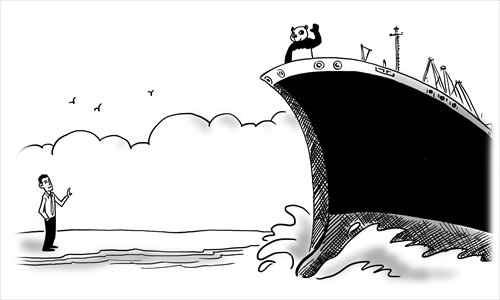Thailand's smooth diplomacy allows solid foundation

Illustration: Liu Rui/GT
Promoting the complementary economic and trading cooperation between China and Africa based on the maritime silk road of the 21st century is of great significance for China to realize its global strategic goals. Nonetheless, the Strait of Malacca will become a development bottleneck if China uses its southeast coast as the starting point of route on the sea.
Therefore, it is indispensable for Beijing to engage in cooperation with Greater Mekong Subregion and build the west bank of the Indo-China Peninsula as a mouth linking the Indian Ocean so that China can circumvent the perilous Strait of Malacca.
Consequently, China is seeking a breakthrough and constructing a strategic pillar to achieve its objectives on the Indo-China Peninsula. Thailand offers a good foundation for such efforts.
Thailand has been resilient in dealing with different powers to avoid the torment of warfare and maintain its independence for the past 150 years. It served as a buffer state of Western powers, including the UK and France, during the colonial period, an anti-communist ally of the US during the Cold War and one of its major non-NATO allies after the September 11 attacks.
Although its historical traditions and diplomatic culture mean that Thailand is not a reliable strategic partner, China does not pursue hegemony on the Indo-China Peninsula and thereby there is no need to forge an exclusive strategic alliance with any other country.
Instead, China is seeking open multilateral cooperation. Thailand's smooth diplomatic policies, largely affected by the Cold War mentality, although unpopular in the international community, can be viewed as a valuable resource to facilitate regional cooperation.
As a strategic pillar in the region, Thailand will play a triple role in advancing regional collaboration on the Indo-China Peninsula.
To begin with, Thailand can help build confidence among stakeholders in this region. Beijing's diplomatic efforts on the peninsula may cause suspicion and vigilance from Washington and Tokyo, but Bangkok will probably help them understand China's activities there given its close ties with all three countries.
In parallel with this, Thailand will lead other countries on the Indo-China Peninsula. Regional states are suspicious of each other when it comes to cooperation, in this case including misunderstandings toward China and dissatisfaction at their neighbors obtaining more benefits.
If Beijing and Bangkok can take the first step to collaborate with each other and demonstrate mutual benefits and win-win progress with substantial profits, it will be conducive to break various suspicions, thus prompting other countries to benefit from China.
China and Thailand can take the lead in exploring an effective cooperation model. With a relatively high degree of mutual trust and similar achievements in economic growth, Sino-Thai cooperation will help shape a creative mode in regional collaboration and provide a reliable approach for both to work with other nations.
In the interconnected high-speed railway project, the two states have addressed in an appropriate way the Thailand's urgent problems including shortage of infrastructure funds and the overstock of rice by introducing consideration settlement of the payment for farm produce. In this way the two sides have largely pushed forward their cooperation in infrastructure.
Apart from that, though Bangkok has yet to decide to launch the evacuation project in the Kra Isthmus located in southern Thailand, an artificial canal connecting the Indian Ocean and the Gulf of Siam in the Pacific Ocean will probably become a reality from a long-term perspective. If China can play an active part in this program, the Malacca Dilemma will work itself out and no longer be a strategic bottleneck for China's maritime power to enter the Indian Ocean.
The author is an associate research fellow at the National Institute of International Strategy, Chinese Academy of Social Sciences. opinion@globaltimes.com.cn